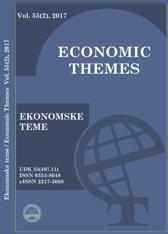Economic Themes (2017) 55 (2) 3, 179-198
Zorica Vasiljević, Nikola Popović, Bojan Dimitrijević, Dragan Vujović, Branka Kalanović Bulatović
Abstract: Viticulture is an important branch of Serbian agriculture. It has a long tradition, but there is the decreasing trend both in areas under vineyards and in grape production. The analysis intends to answer the question what are the reasons for those trends. The main goal of the paper is to analyse the relationship between the decrease in areas under vineyards and the level of investment effectiveness in this type of production. The paper analyses the influence of the governmental agrarian policy measures onto increase of investments’ effectiveness in vineyard establishment. The government has adopted the measures for subsidising the establishment of vineyards. The research analyses the economic effectiveness of investments by using the calculation of investments as well as dynamic multi-periodic methods of investment analysis (Net Present Value – NPV and Internal Rate of Return – IRR). The data for investment analysis (investments, the value of production, operating costs) have been collected by the farms through the survey made in Central Serbia, while the data on the governmental subsidies have been taken from The Ministry of Agriculture, Forestry and Water Management of the Republic of Serbia. The analysis has shown that investments into vineyards are not profitable without governmental subsidies and support.
Keywords: viticulture; investments; economic effectiveness; subsidies; Serbia
INFLUENCE OF THE GOVERNMENTAL INVESTMENT SUBSIDIES ON DEVELOPMENT OF SERBIAN VITICULTURE
Zorica Vasiljević, Nikola Popović, Bojan Dimitrijević, Dragan Vujović, Branka Kalanović Bulatović
Abstract: Viticulture is an important branch of Serbian agriculture. It has a long tradition, but there is the decreasing trend both in areas under vineyards and in grape production. The analysis intends to answer the question what are the reasons for those trends. The main goal of the paper is to analyse the relationship between the decrease in areas under vineyards and the level of investment effectiveness in this type of production. The paper analyses the influence of the governmental agrarian policy measures onto increase of investments’ effectiveness in vineyard establishment. The government has adopted the measures for subsidising the establishment of vineyards. The research analyses the economic effectiveness of investments by using the calculation of investments as well as dynamic multi-periodic methods of investment analysis (Net Present Value – NPV and Internal Rate of Return – IRR). The data for investment analysis (investments, the value of production, operating costs) have been collected by the farms through the survey made in Central Serbia, while the data on the governmental subsidies have been taken from The Ministry of Agriculture, Forestry and Water Management of the Republic of Serbia. The analysis has shown that investments into vineyards are not profitable without governmental subsidies and support.
Keywords: viticulture; investments; economic effectiveness; subsidies; Serbia

